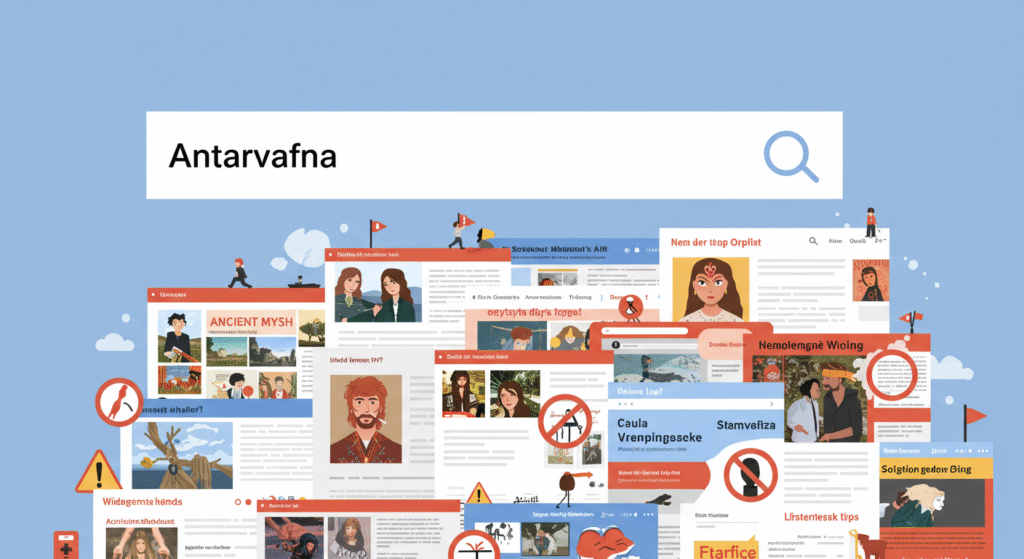The internet is full of weird words. One word that pops up is “Antarvafna.” People search for it a lot. But what is it? Is it a real word with a special meaning? Is it a mistake? Or is it a trick to get clicks online? This article explains the truth about “Antarvafna.” It uses simple words and clear facts. Written by Ramona P. Woodmansee, an expert in online safety, this guide helps you understand what’s real and what’s not on the internet.
Why Antarvafna Is Important
“Antarvafna” is a word that confuses people. It shows up in Google searches. Many want to know what it means. Understanding this word is important. It shows how the internet can trick us. Fake words can waste our time. They can lead us to bad websites. They can even hurt websites trying to rank on Google. This article will help you learn the truth. It will save you from confusion.
Where Does Antarvafna Come From?
To know “Antarvafna,” we need to look at its roots. The word looks like it comes from Hindi or Sanskrit. It seems close to another word, “antarvasna.” In Hindi, “antarvasna” means “inner desire.” The word “antar” means “inside.” The word “vasna” means “desire.” This is a real word in Indian culture. People use it in books and daily life to talk about strong feelings.
But “Antarvafna” is not the same. The part “vafna” is not a real word. It does not exist in Hindi or Sanskrit dictionaries. Experts in these languages do not use it. Old books and scholars do not mention it. This tells us “Antarvafna” is not real. It might be a typo or a made-up word to get attention online.
What Language Experts Say
- Sanskrit Roots: The word “antar” is real in Sanskrit. It means “inside.” It’s in words like “antaratma,” which means “inner soul.” But “vafna” has no meaning.
- Hindi Dictionaries: Books like the Oxford Hindi-English Dictionary list “antarvasna.” They do not list “Antarvafna.” This shows it’s likely a mistake.
- No Scholarly Use: No papers or trusted books talk about “Antarvafna.” This means it’s not a real term.
How Antarvafna Shows Up Online

You can find “Antarvafna” on new websites and blogs. These sites often copy each other. They use the word in titles or articles to get clicks. This is a common trick in SEO. SEO means search engine optimization. It’s how websites try to rank high on Google. But using fake words like “Antarvafna” can mislead people. It can make them think it’s a real term.
What Search Results Show
I looked at Google’s top results for “Antarvafna.” Many pages are not helpful. They are on low-quality sites. These sites say little about the word. Some claim it’s an ancient myth. Others use it in unrelated topics, like games or lifestyle. They give no proof. This shows “Antarvafna” is often used to trick users. It’s not about giving real answers.
Is Antarvafna a Myth?
A myth is a story that people believe but isn’t true. Is “Antarvafna” a myth? Some websites say it’s an old Indian spiritual term. But there’s no proof. No old stories or books mention it. No culture talks about it. This means it’s not a real myth. It’s more likely a new word made up online.
Why It’s Not a Myth
- No Old Stories: Myths come from history or culture. “Antarvafna” has no such roots.
- Only Online: The word is only on new websites, not in books or traditions.
- No Clear Meaning: Myths have lessons or themes. “Antarvafna” has none.
Is Antarvafna a Mistake?
The best guess is that “Antarvafna” is a mistake. It looks a lot like “antarvasna.” Someone might have typed “vafna” instead of “vasna.” This typo could have spread online. Other sites saw it and copied it. This happens a lot on the internet. Small errors can grow big when people don’t check facts.
How Mistakes Grow Online
- Copying Text: Websites often copy from each other. If one uses “Antarvafna,” others do too.
- No Fact-Checking: Many sites don’t check if words are real. This spreads errors.
- Google’s Role: If people search for “Antarvafna,” Google shows pages with it, even if they’re wrong.
Is Antarvafna a Misleading Keyword?

The strongest idea is that “Antarvafna” is a misleading keyword. In SEO, some sites use fake words to get clicks. They pick words that sound interesting but mean nothing. “Antarvafna” fits this. It’s on sites that want to rank high, not help readers. These sites often have little real information.
Why It’s Misleading
- No Real Meaning: “Vafna” is not a word in any language. It’s empty.
- SEO Tricks: Sites use it to attract curious people, not to teach.
- Poor Content: Pages with “Antarvafna” are often vague or repeat the same ideas.
SEO Myths and Fake Keywords
SEO has many myths. Some think using lots of keywords helps rankings. But Google doesn’t like this. It’s called keyword stuffing. It can hurt a website. “Antarvafna” may be part of this problem. Sites use it to seem popular. But Google cares about helpful content. Fake words like this don’t help users.
How Antarvafna Hurts Trust Online
Fake keywords like “Antarvafna” cause problems. They make people doubt what they read. When users find empty pages, they feel tricked. This wastes their time. It can also lead to scams. For websites, using fake words can hurt their Google rankings. It makes them look untrustworthy.
Problems for Readers
- Wasted Time: People read pages that don’t help them.
- Confusion: Fake words make the internet seem less clear.
- Scam Danger: Some sites with fake words may have bad links or scams.
Problems for Websites
- Google Penalties: Using fake words can lower a site’s rank.
- Lost Trust: Readers don’t trust sites with bad information.
- Wasted Work: Time spent on fake words could go to real content.
How to Spot Fake Keywords Like Antarvafna
You can avoid fake keywords. Here are some tips:
- Check Good Sources: Look for words in dictionaries or trusted books.
- Watch for Copycats: Be careful of sites that say the same thing with no proof.
- Use Google Smartly: If a word is only on new sites, it might be fake.
- Ask Experts: People who know languages can tell if a word is real.
SEO and Antarvafna’s Spread
SEO helps spread words like “Antarvafna.” Website owners use tools to find popular search terms. If “Antarvafna” gets searches, they use it. They don’t always check if it’s real. This creates a cycle. More sites use the word, and it seems real. But Google now cares about quality. Fake keywords don’t work as well anymore.
Why SEO Myths Stay Alive
Some website owners believe old SEO tricks. They think fake words or lots of keywords help. But Google’s rules have changed. Updates like the Helpful Content Update reward good content. Fake keywords like “Antarvafna” can hurt more than help.
How to Make Good Content
Website owners can avoid “Antarvafna” mistakes. Here’s how:
- Research Well: Use trusted sources like books or experts.
- Write Simply: Use easy words and short sentences.
- Check Facts: Make sure words are real before using them.
- Help Readers: Write what people need to know, not just what ranks.
What’s Next for Antarvafna?
Will “Antarvafna” stay popular? Maybe not. If people stop searching it, or Google penalizes it, it may disappear. But new fake words will come. Staying smart is key. Learn to spot tricks. Use good sources. This keeps you safe online.
Conclusion
“Antarvafna” is not a real word. It’s not a myth. It’s likely a typo or a trick keyword. It comes from the real Hindi word “antarvasna,” which means “inner desire.” But “vafna” means nothing. Websites use it to get clicks, not to help. This confuses people and hurts trust. By checking facts and using trusted sources, you can avoid these tricks. Ramona P. Woodmansee, an expert in online safety, wrote this to help you stay smart online. Always read carefully and trust good information.
Disclaimer
This article is for informational purposes only, based on research. The author, Ramona P. Woodmansee, provides accurate and honest information about “Antarvafna.” It does not promote any product or service and does not guarantee SEO results. Readers should verify information with trusted sources.
Explore More
- Is ProjectRethink .org Legit or Fake? Trust Score Analysis & Safety Check
- Is ‘Fetl8fe’ a Scam, Spam Keyword, or Just Gibberish? Here’s the Truth
- Is ‘Laaster’ Real or a Fake? How to Stay Safe Online 2025
